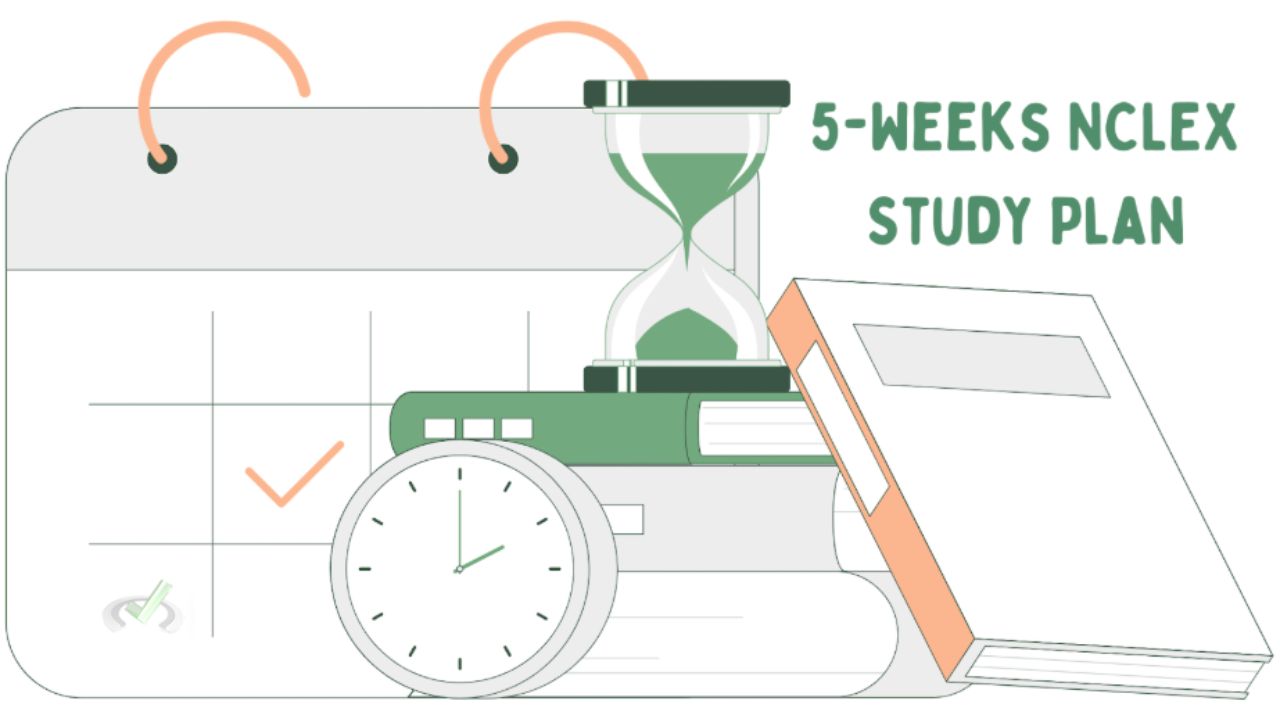
85% of first-time NCLEX test-takers pass. But that also means a good chunk—about 15%—don’t. Now, don’t freak out! The difference between stressing and crushing the NCLEX often comes down to one thing: having a solid 5-week NCLEX study plan.
This blog? It’s here to guide you through that exact plan. We will focus on what works and avoid giving general suggestions. You'll feel prepared to ace that exam with no confusing language and a nice, straightforward approach.
Come on, let's go. At the conclusion of this, you will be an NCLEX ninja!
Week 1: Set the Foundation with Core NCLEX Concepts

Alright, Week 1. We’re not cramming yet—just getting your feet wet. Think of this week as the foundation. You wouldn’t try to build a house without a solid base, right?
Here's where you establish the foundation by concentrating on the essential topics. You want to have a solid understanding of the fundamentals, but you don't have to know every last detail just now.
Give the “Big 4” Nursing Categories Top Priority
First, let's discuss the major guns. Four main categories form the foundation of the NCLEX.
If you start here, you should be fine:
This is where your 5-week NCLEX study plan gets rolling. Make sure to grab a reliable resource like UWorld or Kaplan to guide you through these areas. These tools break things down so you’re not drowning in information.
Plan Your Study Hours (Be Realistic!)
Time to talk about study schedules. No, you don’t need to lock yourself away for 8 hours a day (seriously, don’t). Since you intend to stay in this for the long run, you must pace yourself. Goal for two to three hours every day throughout Week 1. You're not studying, you're building.
Here's an easy method:
No need to go overboard just yet. Trust me, slow and steady wins the NCLEX race.
Get Familiar with NCLEX-Style Questions
Now, here’s where some people mess up. Don’t just study content and push off the questions until later. NCLEX questions are tricky. It's incredibly, really tricky. Put them into practice right away, even if you're just beginning to understand how they operate.
Understanding the format of the questions is crucial in Week 1. They examine how you use the information, not just your knowledge of them. So sure, settle in NCLEX-style immediately away.
Week 2: Examining High-Yield Content in Depth

You survived the first week of introductions! It's time to increase the ante now.
Focus on High-Yield Topics (These Show Up a Lot!)
Here’s the deal, some topics are going to come up more than others.
These are the ones to focus on this week:
These topics are your bread and butter for the exam. You don’t need to know everything, but you definitely need a solid handle on them.
How to Break Down Difficult Topics
So, pharmacology and cardiovascular issues got you sweating? I hear you. But don’t worry, there’s a way to make them manageable.
Week 3: Increase Question Practice and Analyze Your Mistakes

You should have a firm grasp of the material by now. Now is the time to focus on the questions that resemble those on the NCLEX. It's likely that you've realized these are unique questions. In Week 3, we will be increasing the level of practice and learning from your errors as we ramp up the intensity.
Aim for 75–100 Inquiries Per Day
Seems like a lot, does it not? Remain calm. It's what you've been working toward. The goal now is to answer 75-100 questions a day. This isn’t just about practicing content; it’s about getting comfortable with the types of questions you’ll face.
Here’s what you’ll focus on:
The more you practice, the more these patterns will start to click. Soon, you’ll be seeing NCLEX questions in your sleep (in a good way).
Keep a "Mistakes Journal"
You know what’s even more important than answering questions? Learning from the ones you mess up. That’s where a mistakes journal comes in. Every time you get a question wrong, write down why.
The goal is to spot patterns and figure out where you’re going wrong. That way, by the time you’re in Week 5, you’ll have fine-tuned your approach and locked down the stuff that was tripping you up.
Week 4: Simulate the NCLEX Experience
You’re officially in Week 4, and now it’s time to get serious. You’ve been practicing questions and reviewing content, but now it’s about testing your endurance. The NCLEX is long, so you need to train for it, like you would for a marathon.
Take Two Full-Length Practice Tests
Yep, it’s time to take the plunge. This week, you’ll tackle two full-length practice exams. Each test should be around 145 questions, and you need to do it in one sitting. That’s right—no breaks (aside from the ones allowed on test day).
Here’s the plan:
Your endurance will increase and you will get a sense of the pace with these practice exams. You'll also be able to observe which areas you're doing well and which still want improvement.
Examine Your Findings Using a Fine-Tooth Sponge
Don't simply review your results and call it a day once you finish each test. No, let's take a closer look at the outcomes. Review each question, regardless of your answer.
By the end of Week 4, you’ll know exactly what you need to focus on for the final push.
Week 5: Final Review and Confidence Boosters

Here we are—the final week. You’ve made it through the hard part, and now it’s time to polish up what you’ve learned. This is where you review your weak spots and, most importantly, build your confidence.
Focus on Your Weak Areas
This week, you’ll zero in on the topics that have been giving you the most trouble. Maybe it’s pediatrics, or maybe those lab values are still tripping you up. Whatever it is, spend this week reviewing those areas.
You don’t need to study everything again—just focus on the stuff that’s still feeling shaky.
Practice Relaxation Techniques
It’s normal to feel nervous as the exam gets closer. But don’t let that anxiety mess with your game. Use this week to practice relaxation techniques, so you’re walking into the exam feeling cool and collected.
In Conclusion, Stress-Free Prepared
Here it is, a comprehensive 5-week NCLEX study plan that will help you get ready without breaking the bank. You have completed high-yield topics, gone over the essential material again, aced practice questions, and even took a test simulation. You ought to be feeling great by now and prepared to ace the NCLEX.
Recall that this exam is only a small portion of your nursing career. It's time to showcase your abilities now that you've completed the task and adhered to the strategy. Get out there and bring it to pass!
